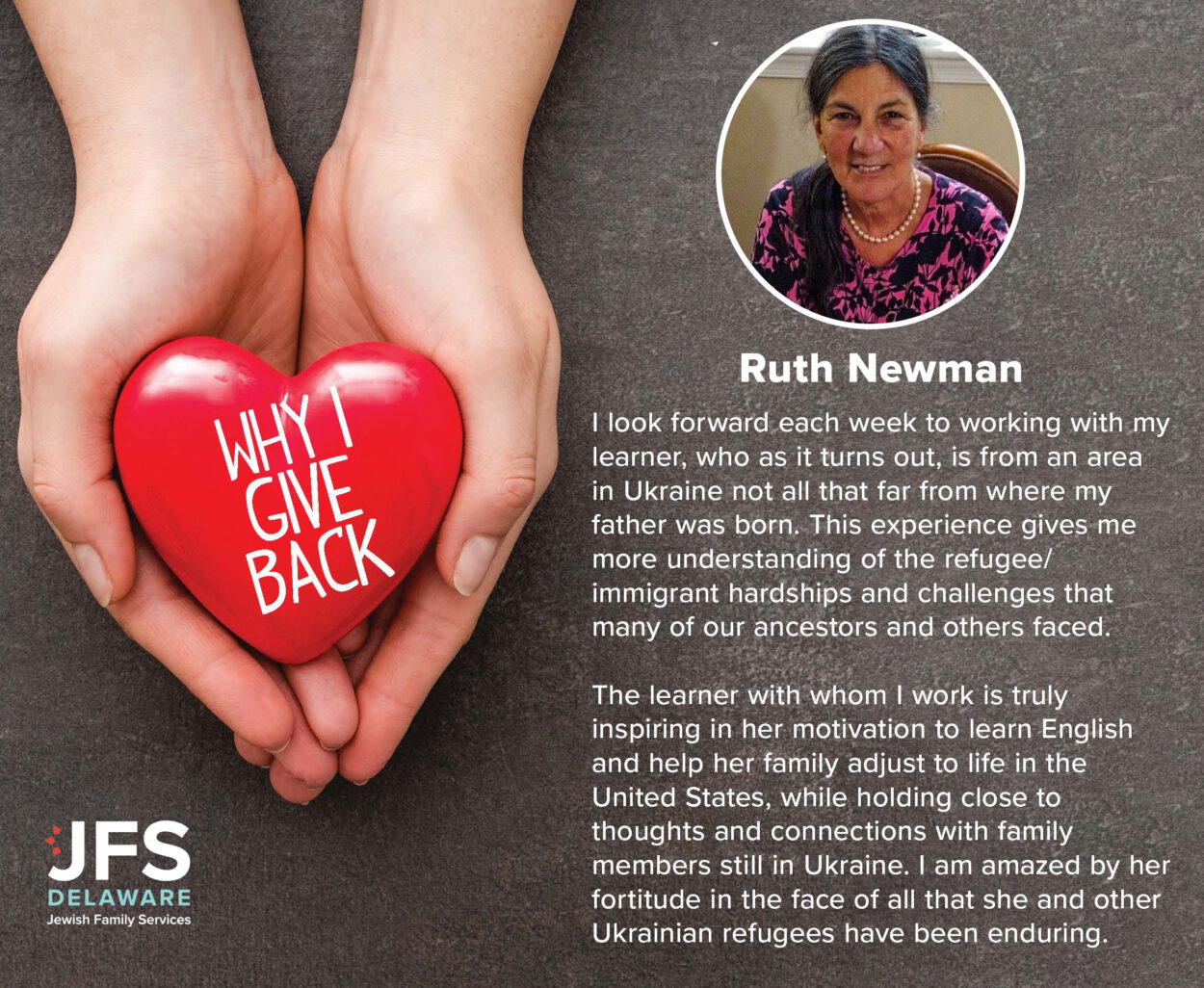
For the Giving Back issue of the Jewish Living Delaware Magazine, several of our volunteers reflected on why they give back and the impact that volunteering has had on them and the lives of those they serve. Ruth Newman shares her thoughts below.
As I reflect back on this past year of 5783, it stands out to me that one of my most important and personally rewarding endeavors has been the work I have done in tutoring English with a Ukrainian refugee!
It was Basherte that just as I was thinking that I needed to do more to assist Ukrainian refugees, the opportunity to tutor through JFS Delaware presented itself during a meeting of the Jewish Community Group where I live!
As someone who has retired from a long career as a teacher, it was a perfect fit for me to be able to continue teaching, and to branch out into a new area of teaching. I have learned, though, that you need not have experience in the education field to do this work. Jewish Family Services partners with Literacy Delaware, who provides a wonderful training program along with learner assessments and tutoring materials! The hours can be very flexible, and there are options for virtual tutoring.
I look forward each week to working with my learner, who as it turns out, is from an area in Ukraine not all that far from where my father was born. This experience gives me more understanding of the refugee/immigrant hardships and challenges that many of our ancestors and others faced. The learner with whom I work is truly inspiring in her motivation to learn English and help her family adjust to life in the United States, while holding close to thoughts and connections with family members still in Ukraine. I am amazed by her fortitude and pleasantness in the face of all that she and other Ukrainian refugees have been enduring. I am so glad to be able to help her learn English and better understand some aspects of American life.
The support from JFS Delaware has been great, as has been the support from Literacy Delaware. I always feel that there is someone to answer questions and address any issues that arise!
As I look forward to 5784, I wholeheartedly plan to continue with this tutoring work! I would highly recommend that anyone who thinks they might have an interest in tutoring, contact Jewish Family Services of Delaware. I understand that the need for tutors is great!
If you would like to volunteer with JFS Delaware and make a difference in the lives of those we serve, click here. You can also donate to JFS Delaware here. To view the Give Back article in Jewish Living Delaware, click here.
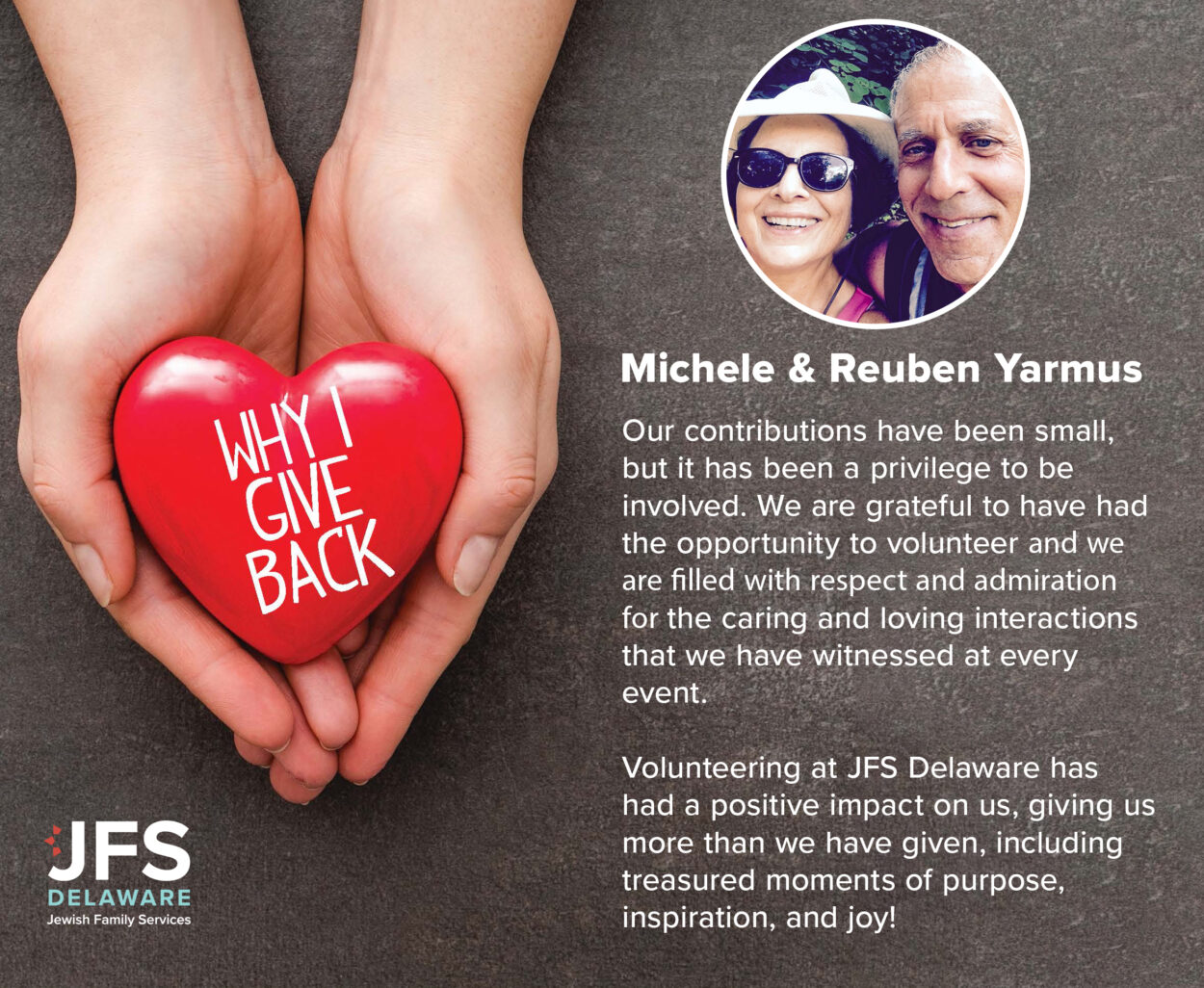
For the Giving Back issue of the Jewish Living Delaware Magazine, several of our volunteers reflected on why they give back and the impact that volunteering has had on them and the lives of those they serve. Michele and Reuben Yarmus share their thoughts below.
We heard JFS Delaware Community Relations Manager Vlad speak at the First Unitarian Church of Wilmington and listened with great interest to Vlad’s personal story. His country of origin was the same as that of one of our parents, and their journeys shared many common threads. We were immediately drawn to the idea of volunteer service in support of JFS and most notably their work with refugee populations. Our interest in refugees is attributable to lifelong study of diverse languages and cultures, including years spent traveling and living abroad, to decades of involvement with immigrant populations as career educators and to the challenges experienced by our own families as members of the Jewish diaspora.
Our contributions have been small, but it has been a privilege to be involved. We are grateful to have had the opportunity to volunteer and we are filled with respect and admiration for the caring and loving interactions that we have witnessed at every event. Volunteering at JFS Delaware has had a positive impact on us, giving us more than we have given, including treasured moments of purpose, inspiration, and joy!
If you would like to volunteer with JFS Delaware and make a difference in the lives of those we serve, click here. You can also donate to JFS Delaware here. To view the Give Back article in Jewish Living Delaware, click here.
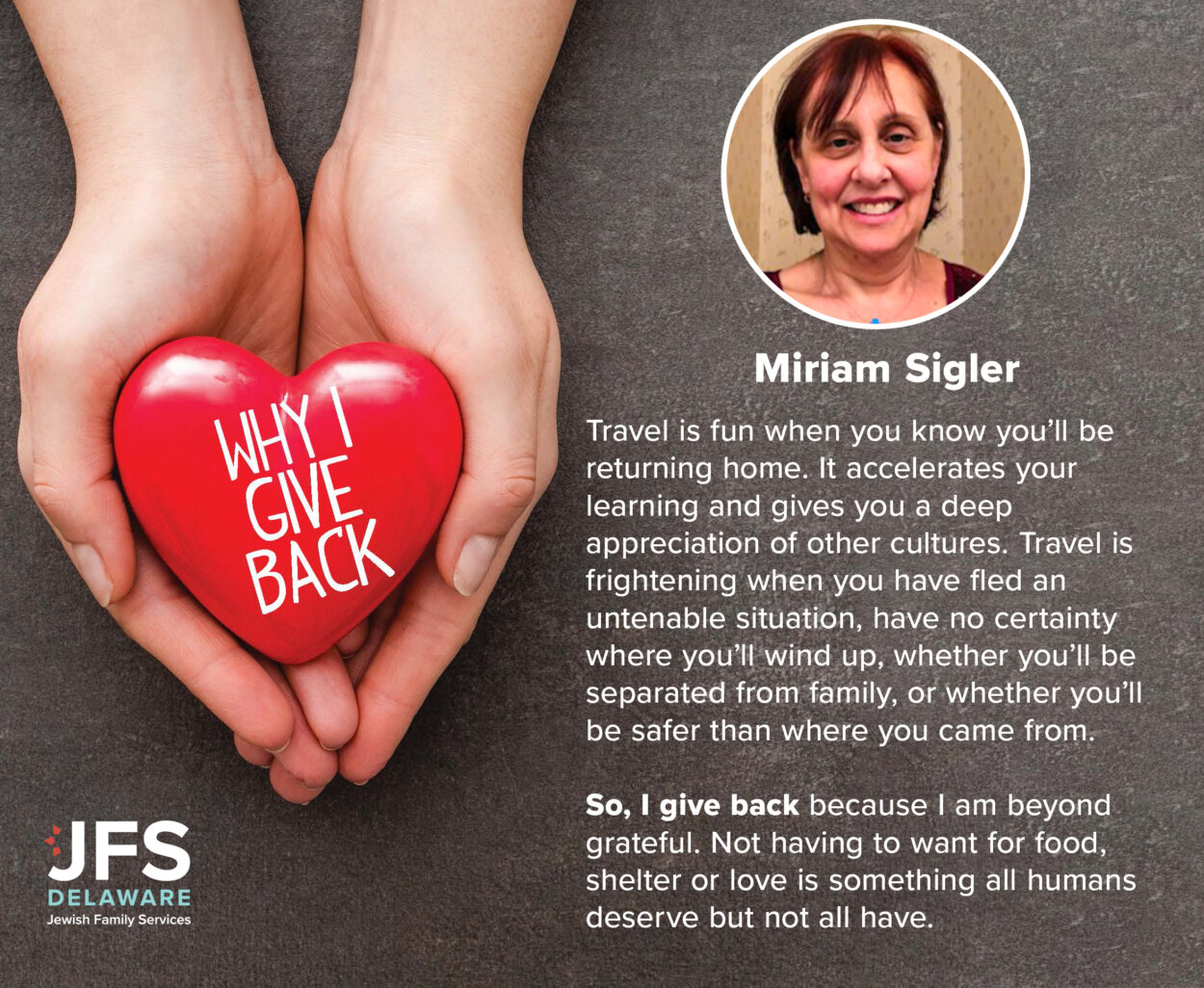
For the Giving Back issue of the Jewish Living Delaware Magazine, several of our volunteers reflected on why they give back and the impact that volunteering has had on them and the lives of those they serve. Miriam Sigler shares her thoughts below.
When I was 15 and visiting cousins in Israel, my uncle hatched the idea of camping through Europe. My aunt and five cousins loaded up their VW bus onto a ship in Haifa and disembarked in Greece. Weeks later, we were in France.
Gratitude does not come close to describing that experience. Travel is fun when you know you’ll be returning home. It accelerates your learning and gives you a deep appreciation of other cultures. Travel is frightening when you have fled an untenable situation, have no certainty where you’ll wind up, whether you’ll be separated from family, or whether you’ll be safer than where you came from.
So, I give back because I am beyond grateful. Not having to want for food, shelter or love is something all humans deserve but not all have.
I can’t solve forced migration, but I can be a part of the solution. In 2012, HIASPA invited me to be its liaison for congregational support. I educate my congregants on the need for safe refuge, and how to support this effort. HIASPA is an affiliate of Hebrew Immigrant Aid Society (HIAS), which is the oldest refugee resettlement agency in the USA.
In 2016, I joined Jewish Family Services of Delaware’s Refugee Integration Support Effort (RISE). Through a partnership with Literacy Delaware, I taught English to African refugees and helped with resume writing, financial literacy, setting up passwords, and connecting clients to transportation.
In early 2020, I was selected as a Spanish interpreter for the HIAS Border Fellows program. I interpret between asylum seekers and lawyers. A particularly detailed case involving a Honduran family fleeing gang violence reminded me that my problems are tame.
My grandfathers escaped ethnic cleansing in Russia and Poland, making it possible for me to live a comfortable, safe life.
So, I give back.
If you would like to volunteer with JFS Delaware and make a difference in the lives of those we serve, click here. You can also donate to JFS Delaware here. To view the Give Back article in Jewish Living Delaware, click here.
Written by: Yulia Watters, Licensed Marriage and Family Therapist, Owner of Finist and the Owl, JFS Volunteer
The war that continues to ravage the country of Ukraine has led to the massive displacement experienced by a multitude of Ukrainian families. Who are these families? What do we know about their culture? How we can help Ukrainians become accustomed to life in the US and become integrated into our communities?
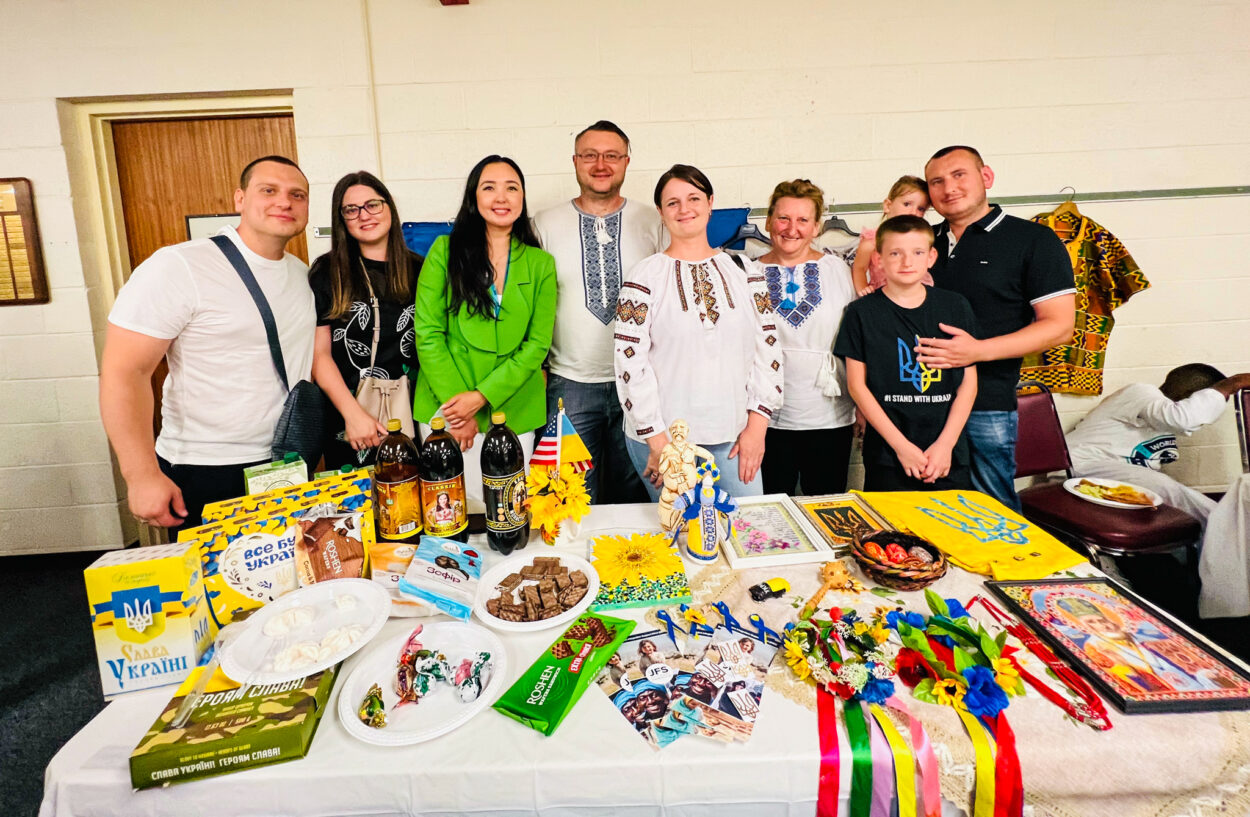
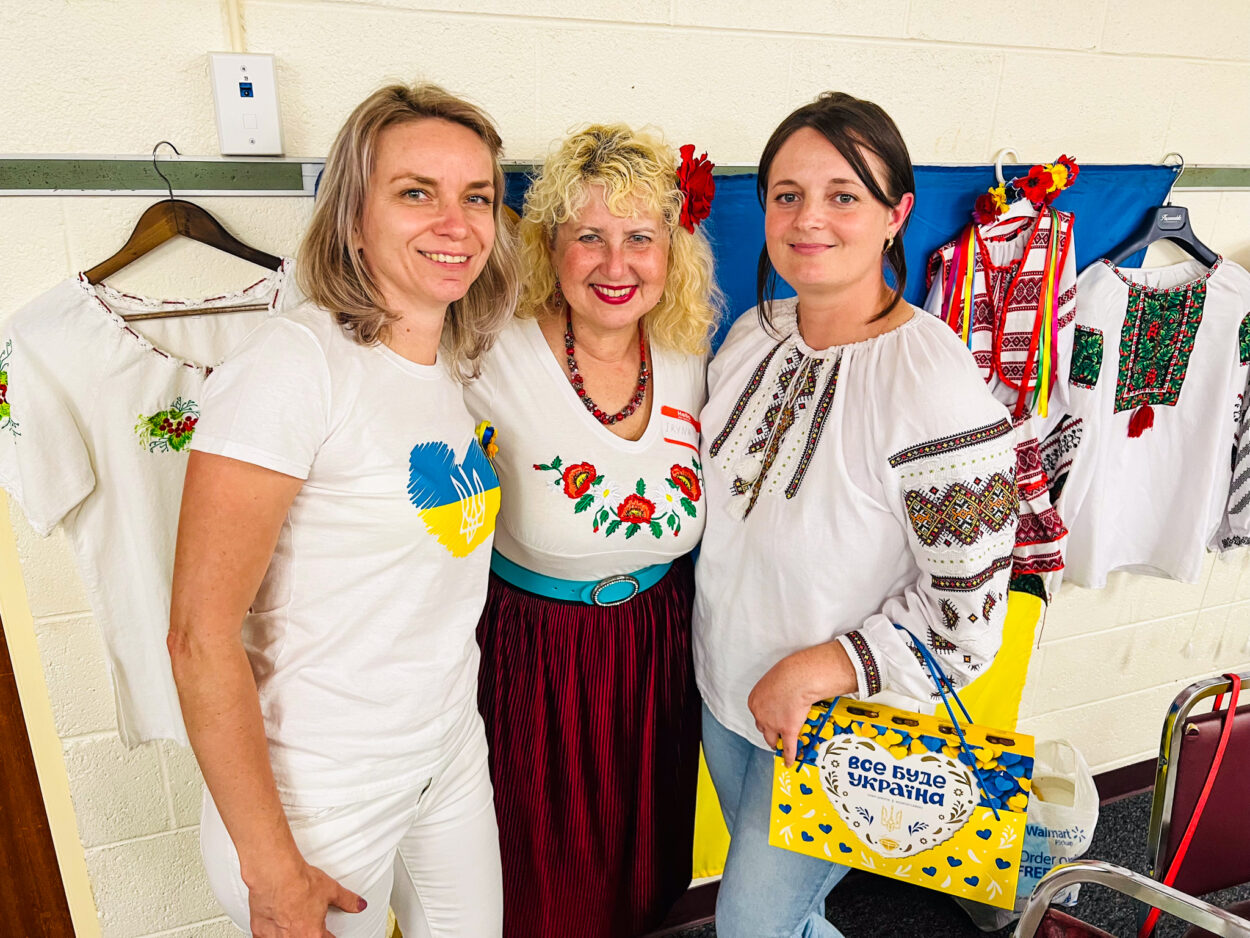
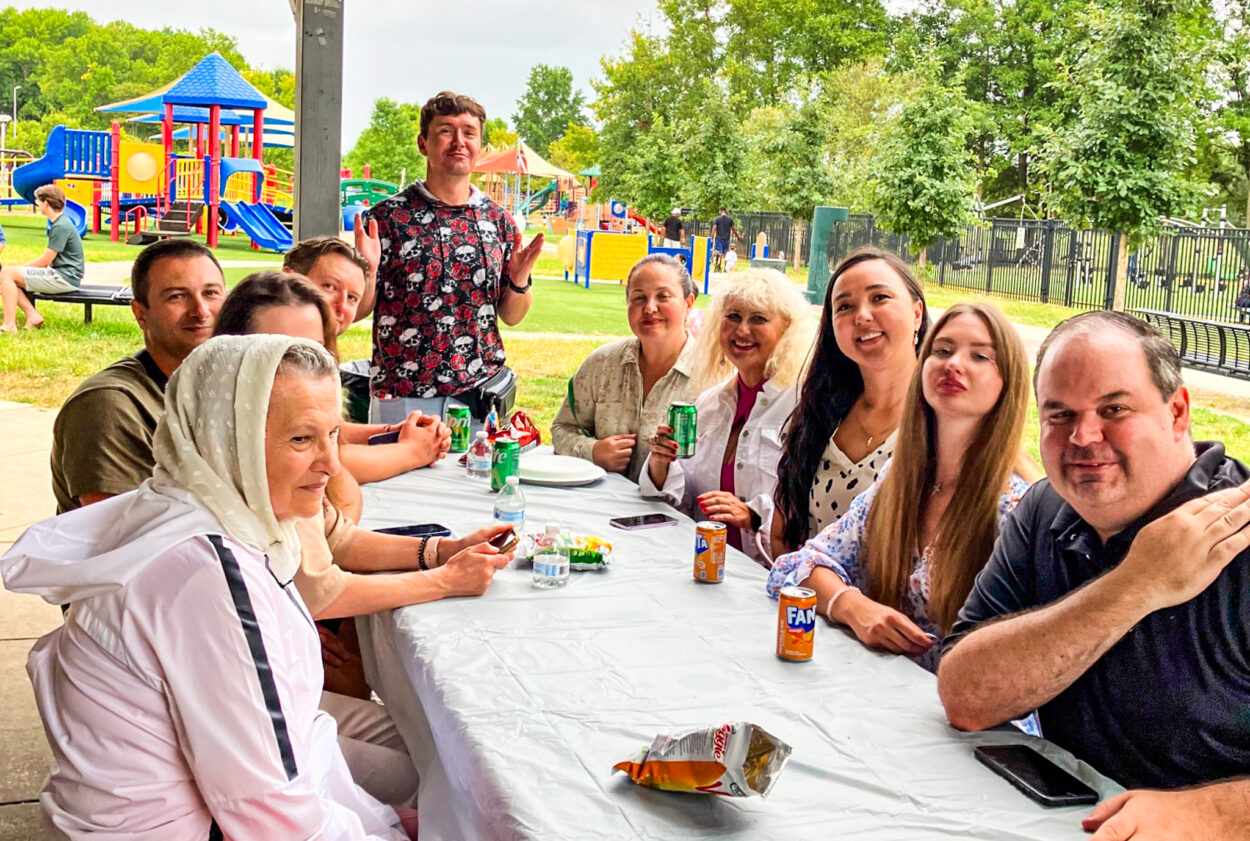 none of the Ukrainians coming to Delaware were Jewish, the organization’s mission is to assist any person experiencing displacement. A JFS program manager contacted me asking for my help, as it appeared that I am the only Russian-speaking licensed family therapist in Delaware. Since the beginning of the war, the thought that any human being is living through a situation of deprivation, fear, and imminent threat of death never left me, pushing me to find ways to be involved in helping the civilian population that has to face the war on a daily basis, personally or through their loved ones. If you know of any Ukrainian person who would like to have a psychological assistance of a Russian-speaking therapist, I am here to help. In addition, my dream is to provide a safe space for a cultural connection among people from different walks of life, religion affiliations, and sexual orientations. With this idea in mind, I opened doors of my independent bookstore, Finist and the Owl, on April 22, 2023. The store has books in English, French, and Russian, and several rooms set up for children of different ages as well as some books for adults. I am hoping that this artistic space can provide solace and nourish souls for people facing the necessity to flee the country they love and for their generous hosts. Everyone is welcome to the store and I hope the experience will be regenerating.
none of the Ukrainians coming to Delaware were Jewish, the organization’s mission is to assist any person experiencing displacement. A JFS program manager contacted me asking for my help, as it appeared that I am the only Russian-speaking licensed family therapist in Delaware. Since the beginning of the war, the thought that any human being is living through a situation of deprivation, fear, and imminent threat of death never left me, pushing me to find ways to be involved in helping the civilian population that has to face the war on a daily basis, personally or through their loved ones. If you know of any Ukrainian person who would like to have a psychological assistance of a Russian-speaking therapist, I am here to help. In addition, my dream is to provide a safe space for a cultural connection among people from different walks of life, religion affiliations, and sexual orientations. With this idea in mind, I opened doors of my independent bookstore, Finist and the Owl, on April 22, 2023. The store has books in English, French, and Russian, and several rooms set up for children of different ages as well as some books for adults. I am hoping that this artistic space can provide solace and nourish souls for people facing the necessity to flee the country they love and for their generous hosts. Everyone is welcome to the store and I hope the experience will be regenerating.
If you would like to volunteer with JFS Delaware and make a difference in the lives of refugees, click here. You can also donate to JFS Delaware here.

Written by: Betsy Price, Delaware Live
The Brandywine Festival of the Arts returns to Brandywine Park for its 62nd year this weekend — Sept. 9 and 10 — for its largest show with 250 artisans and 16 food vendors.
The featured artist will be Edwin Lester, a self-taught painter who brings a sophisticated and technically advanced style of realism to his figurative and atmospheric paintings.
The Philadelphia native has exhibited in galleries and museums across the nation. His painting, “Worn But Not Out,” is on the cover of the 2023 U.S. Civil Rights Trail Travel Guide.
But the heart-warming story of the festival will belong to Oksana Pivush, a 47-year-old Ukrainian who left that country six months ago.
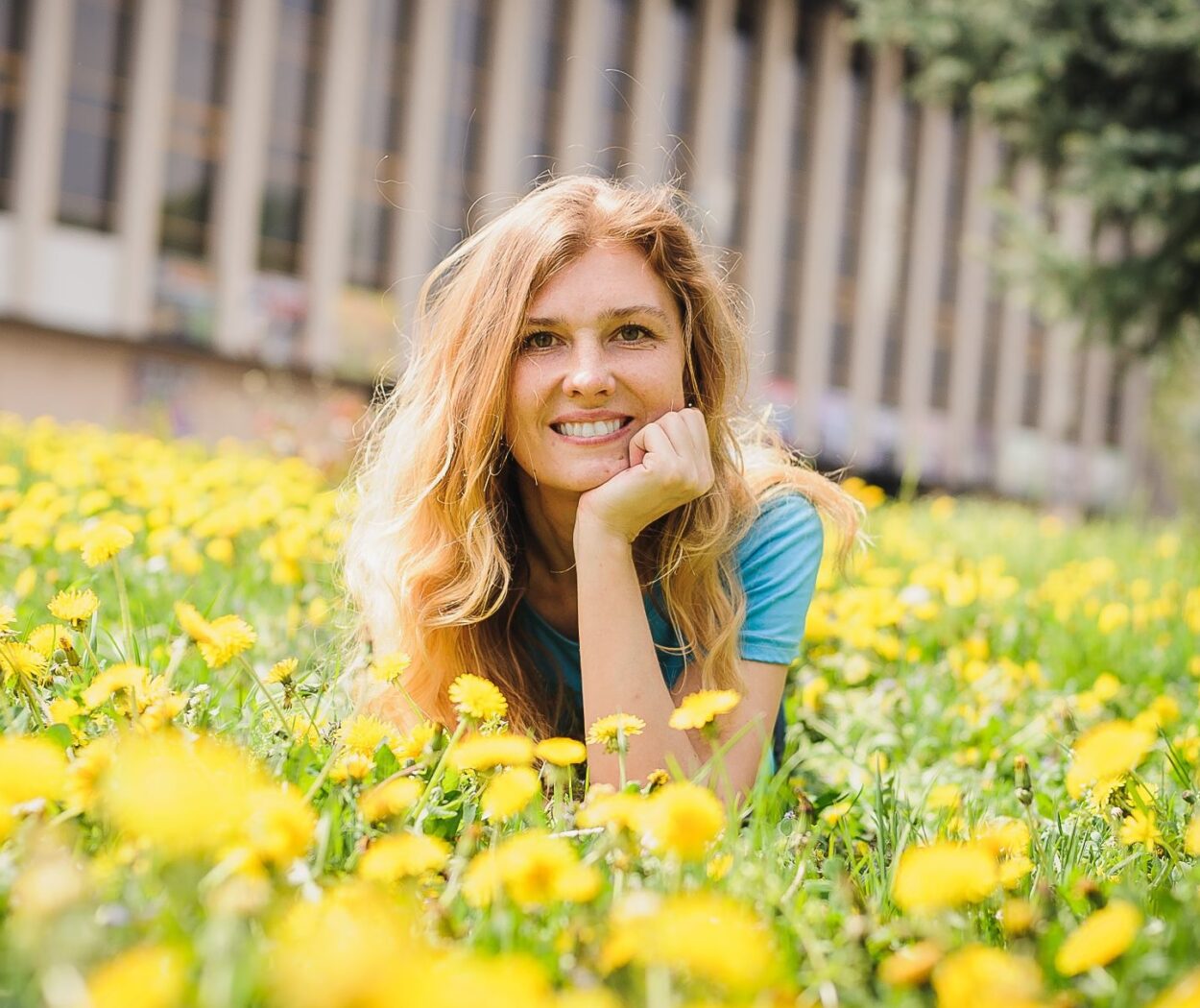
Oksana Pivush
She knows little English and relied on the Jewish Family Services to help her settle into an apartment in downtown Wilmington and get a full-time job as a housekeeper at the Hyatt on the Riverfront.
She uses her mobile phone to translate conversations to help her cope with a new country, home and job.
Somewhere along the line, she told her JFS mentor Dr. Lanny Edelsohn that she made and sold jewelry in Ukraine and showed him samples of her work.
He took them to Barry Schlecker, who runs the festival, and Barry offered her a booth at the festival for no charge. Schlecker then introduced Pivush to jewelrymaker Faith Rosenblatt, who is loaning Pivush display materials to set up her booth.
Using short sentences, which are easier to translate, Pivush said Tuesday via Facebook Messenger that she is grateful to Jewish Family Services and Edelsohn for helping her get settled and involved with the Brandywine Festival of the Arts.
She’s always been crafty. As a child, her mom had taught her how to knit and crochet. Pivush grew up making clothes for herself and others.
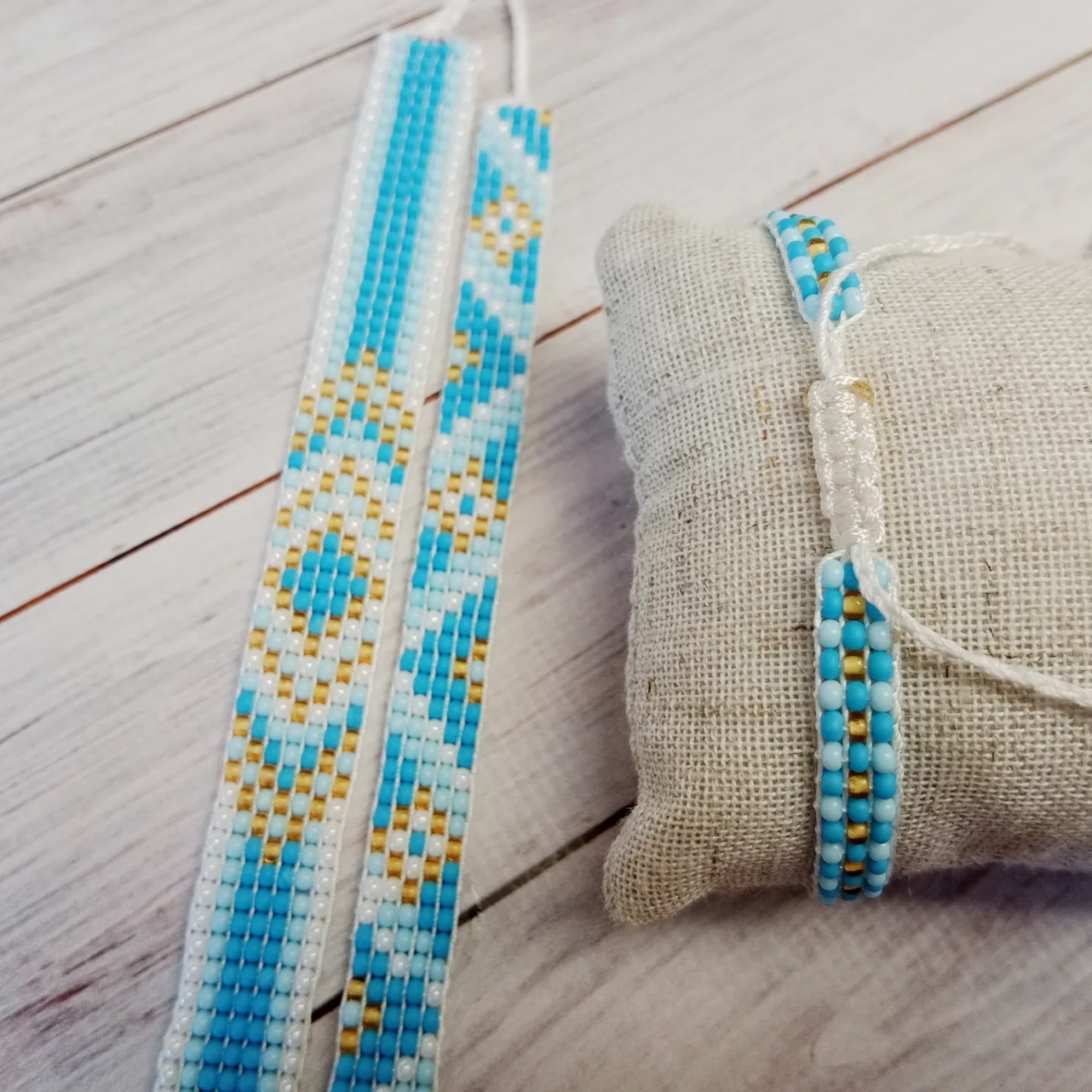 Then Pivush’s own 10-year-old daughter bought her a book about beading and asked her mom to teach her how to weave bracelets.
Then Pivush’s own 10-year-old daughter bought her a book about beading and asked her mom to teach her how to weave bracelets.
“First I had to learn to do it myself, then teach my daughter, who quickly lost interest in it, ” she wrote. “I am very enthusiastic about this craft. After a while I started making bracelets from shoelaces and began to go out to sell it in my city. People were buying.”
Pivush became interested in embroidery and decided to combine microembroidery and knitting to make children’s toys.
“So my skills and hobbies increased,” she said. “I got great pleasure from the fact that I could do it and that people liked it. I started to improve my skills. After a while I quit my job and started doing only needlework.”
The town she lived in is more than 1,000 years old and the site of an ancient castle, she said.
“Near the castle I used to sell my handicrafts to visiting tourists and residents of this city,” she said. “My hobby turned into a small business.”
She was doing it for more than 1o years when the war with Russia broke out.
“Of course, there were no more tourists. People started fleeing the country, especially from the regions that were heavily bombed,” she said. ” There were only refugees in our town, mostly those who had fled to the EU countries. A very beautiful, rich and actively developing country began to turn into a depressing one. People’s incomes began to decrease sharply and prices began to rise dramatically. It became very difficult to live.”
Pivush decided to move to the United States. She packed a few essentials, some finished products and materials for her work.
“And I went to meet my destiny on the other side of the world, alone with a small dog, who is my friend, companion and psychologist,” she said.
Once here, Pivush created a new store on Etsy in hopes it would gain momentum. She had to get a job to pay her rent, which leaves little time for her jewelry and toy business.
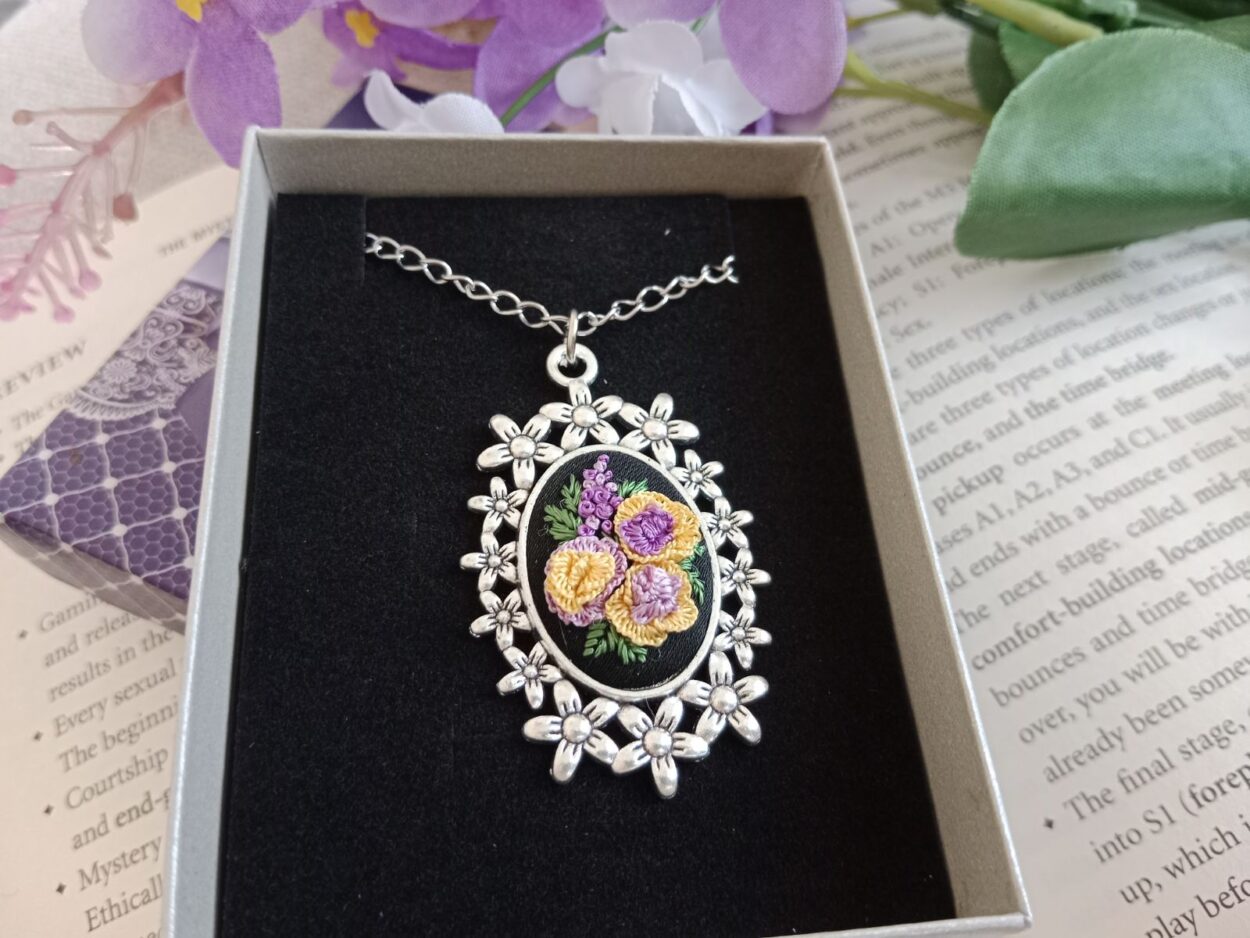 “But I hope that in the future I will be able to develop my small business of creating handmade jewelry here,” she said. “I really believe and hope that this festival will help me move forward in this direction. It is a huge incentive for me to keep creating and making new jewelry.”
“But I hope that in the future I will be able to develop my small business of creating handmade jewelry here,” she said. “I really believe and hope that this festival will help me move forward in this direction. It is a huge incentive for me to keep creating and making new jewelry.”
She puts a lot of love into every piece she creates, she wrote.
“And when people like it, when they wear it with pleasure, it gives me energy and I become even happier,” she said.
Pivush will be among the painters, photographers, jewelry makers, ceramicists, woodcrafters and fabric artists from the Mid-Atlantic, New England, Virginia, Florida and the Midwest.
In addition to art and food, the event features music, children’s activities and pet-adoption opportunities.
As many as 15,000 people visit the festival, held every year on the banks of the Brandywine River.
The event is timed not only to mark the transition from summer to fall but also to signal peak season for home redecorating and the early purchase of holiday gifts.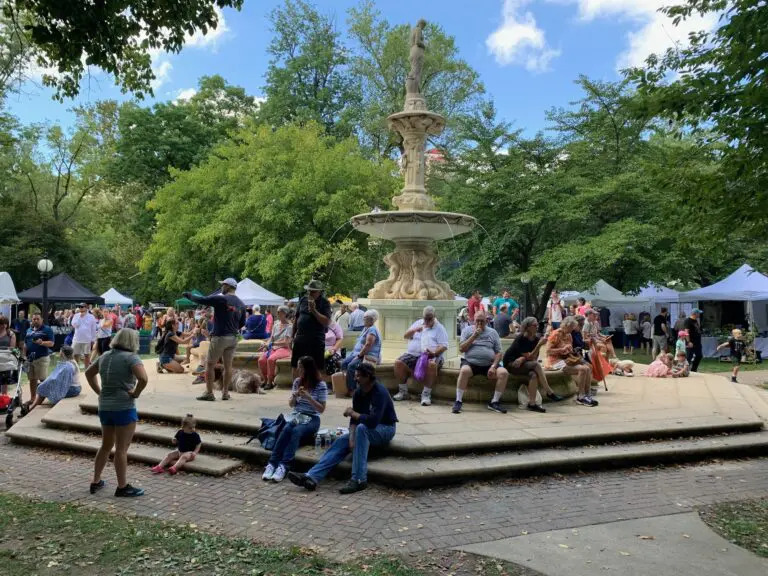
Schlecker says the festival team has put added emphasis this year on expanding and diversifying food and snack options. This year’s offerings include Asian fusion, vegetarian, BBQ, soul food, chicken, seafood, ice cream, water ice, kettle corn, caramel and honey treats.
Musicians from OperaDelaware will perform on Saturday and Sunday.
Brandywine Park is at 1001 N. Park Drive, opposite the Brandywine Zoo. Free parking and shuttle bus service will be available at Incyte, 1801 Augustine Cutoff.
The festival will be open from 10 a.m. to 6 p.m. Saturday, Sept. 9, and 10 a.m. to 4 p.m. on Sunday, Sept. 10.
Admission is $5 per day, with children 12 and under accompanied by an adult admitted free. Friendly pets on leashes are welcome at the festival and on the shuttle buses.
For more information, go to brandywinearts.com or facebook.com/brandywinearts.
Written by: Michael, Director of Clinical Services

Over the past decade, significant attention has been given to the topic of mindfulness. The Nations schools have developed mindfulness programs to assist students achieve. Mindfulness has made an appearance in the clinical world in the form of mindfulness-based therapies. However, the question remains, how does one develop a mindfulness-based practice and cultivate attitudes that are fundamental in the practice of mindfulness? Below are the seven key components that are the foundation to any mindfulness-based practice:
1. Non-Judging
When beginning a mindfulness practice your thoughts will wander. Many thoughts may flood your mind, such as future commitments, family, and work. That is perfectly fine and to be expected. There is no need to judge yourself for this. You are developing a “practice” and like any new skill, mindfulness will take time to develop. If the mind begins to wander, simply focus on your breathing as an anchor. This is a perfect opportunity to treat yourself with loving kindness and simply return your attention to the breath.
2. Patience
As is in life, things will develop at their own pace. Developing patience with ourselves and with our mind allows us to be open to the present moment. Enjoy the journey of mindfulness practice. We need not rush to the finish line. We are exactly where we need to be.
3. Beginners Mind
As best you can, view the present moment with clear eyes. Often, we allow our past, our beliefs, our expectations of what life should be, and our personal preferences to cloud the present moment. See the present moment with the eyes of a beginner, as if you are a newborn seeing the world for the first time.
4. Trust
Frequently our world gives us messages to not trust ourselves. We seek external validation and over time are taught to ignore our inner voice. Part of the mindfulness meditation process is to begin to turn inwards and trust ourselves and begin to listen to our inner voice. This process allows us to reconnect with our core self. A self that is often lost in the world.
5. Non-Striving
In mindfulness meditation one should develop an attitude of “non-doing.” This can be challenging. We are taught to have goals and that our actions should have a purpose and lead us to our goals. When we meditate, we need not strive for anything. We don’t need to strive to be a meditation master. The art is to hold our attention and awareness in the present moment exactly as the present moment is. Try your best not to shift to a goal setting perspective. Simply allow the experience to be as it is.
6. Acceptance
It is difficult to let things be as they are, especially if we are attached deeply to a different outcome. We may try to change the situation to be more desirable or to produce a more acceptable outcome. However, when we accept the current moment for exactly what it is, we are able to open up our awareness fully to the present moment.
7. Letting Go
During meditation you may notice that your mind wants to hold on to thoughts, feelings, and inner experiences. This is completely normal and natural. Part of mindfulness is to allow ourselves to not get caught in the cycle of grasping. As best we can, we can give ourselves permission to let go of these sensations and rest the mind in the present moment without distraction, attachment, or aversion.
Michael Angelo, LPCMH, CADC, is a Licensed Professional Counselor of Mental Health, serving as an Outpatient Therapist and Director of Clinical Services for JFS Delaware. His treatment approach is person-centered and utilizes mindfulness based cognitive techniques. Michael has over twenty years of experience working with individuals with mental health and substance use disorders.
As Clinical Supervisor, Michael leads JFS’ clinical team in group supervision and manages efforts to streamline clinical processes, trainings, and documentation; he is responsible for ensuring the quality of JFS’ therapeutic service to meet the highest industry standards.
Start your therapy journey today by submitting an online intake form or contact our Intake Department at 302-478-9411 ext. 306
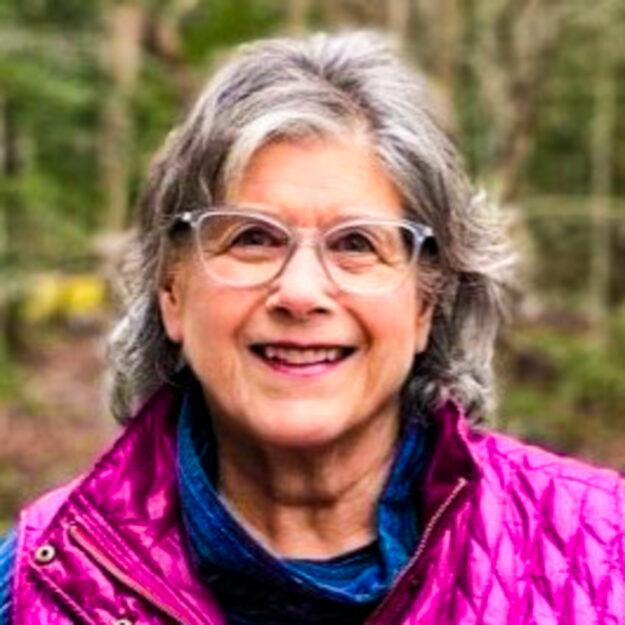
Let’s meet Kathie!
Kathie is an Oncology Social Worker with Cancer Care Connection, an affiliate of JFS Delaware. She has over 10 years of clinical experience serving the community and supporting individuals and caregivers impacted by cancer and other life stressors. Kathie’s prior work experience includes supporting clients who are managing and coping with depression and anxiety, grief and loss, trauma, and adjustment to planned and unplanned life transitions. Kathie practices from a collaborative, strengths-based and person-centered perspective.
Why did you decide to work for Cancer Care Connection?
“After completing graduate school to begin a second career in social work, Cancer Care Connection’s advertisement for a social worker intrigued me. During my own cancer experience, there was very little attention paid to the psychosocial impact of cancer on one’s life. Later, while working in human resources, I witnessed the bio-psycho-social impact and distress that adult and childhood cancers had on my colleagues’ hearts and souls – whether they were patients, parents, family, or caregivers.”
What inspires you to come to work every day?
“My incredible colleagues and knowing we can provide a bit of relief to patients or their families and/or caregivers.”
What is the best part of your job?
“I deeply value the opportunity to provide a safe space for “unhurried conversations,” allowing patients and caregivers to voice their hopes, concerns, and frustrations to a non-judgmental professional. Witnessing the relief that listening, coaching about stress reduction tools, and providing pragmatic resources, when possible, is a privilege.”
What is a fun fact about you?
“I used to be terrified of dogs, but since our son came home from college with a huge Great Dane/Lab mix, I love them. Since then, we’ve had three big dogs. Exposure therapy at work?”
If you could go anywhere in the world for your next vacation, where would you go? Why?
“On a road trip with my bestie searching out independent bookstores, fabric and yarn stores, and Airbnbs near water where we can read, relax, laugh, and rejuvenate.
Why? Time is short and we’ve worked long and hard!”
When you were young, what did you want to be when you grew up?
“An English professor or nurse.”
What is one food you could eat every day?
“Embarrassing but true: Mashed potatoes – with butter!”
What is the last show you binged?
“Ted Lasso – favorite line is “Be curious, not judgmental.”
What is the best book you ever read?
“Again, more than one answer! The Color Purple, by Alice Walker and Jane Eyre, by Charlotte Bronte.”
What are you most thankful for you in your life right now?
“In addition to my family, friends, and colleagues – being semi-retired and not having to rush in the morning!”
Cancer Care Connection, an affiliate of JFS Delaware, helps people affected by cancer navigate the full range of the issues they face, make informed decisions, and take action on their own behalf. Oncology Social Workers provide professional coaching, personalized information, and resource connections so every person affected by cancer can obtain their best possible outcome. Learn more and get started here.
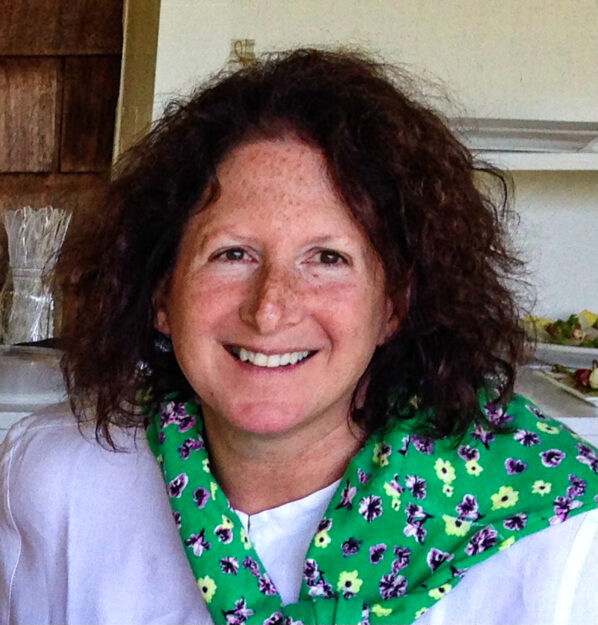
We here at JFS Delaware would not be able to fulfill our mission to strengthen individuals, families, and the community without the help of our incredible volunteers. One of those amazing volunteers is Gail. Let’s get to know Gail!
Why did you decide to volunteer for JFS?
“I’ve never stopped being motivated by the idea that saving one life is the same as saving all. In this instance, I was inspired by my lifetime friend, Beverly Shreve, who found out about this need in resettling refugee families in DE.”
What is the best part of volunteering?
“The knowledge that you helped someone achieve something they couldn’t have done on their own….making the possible a reality.”
Would you recommend volunteering for JFS? Why?
“Yes! The need is universal and never ending and you can find a need that fits your time/talent/treasure/resources.”
What is a fun fact about you?
“I have four grandchildren and one more on the way and they are all right here in the Wilmington area!”
If you could go anywhere in the world for your next vacation, where would you go? Why?
Canada. It’s a bit of an inside family joke that I have never taken my children (now grown of course) on a trip to Canada, whereas they have been to Asia, Africa, Europe, Scandinavia, Central and South America…and mostly on their own!”
When you were young, what did you want to be when you grew up?
“A bank president.”
What is one food you could eat every day?
“Chocolate!”
What is the last show you binged?
“Jack Ryan.”
What is the best book you ever read?
“The Man Who Was Magic, by Paul Gallico. Given to me by a friend in college, it made me realize that I really do believe in magic and often you make the magic yourself.”
What are you most thankful for you in your life right now?
“I am endlessly grateful that my grown children and their families and my mother all live within a 10-mile radius of each other. If there ever was a need, we could literally walk to find each other and be together, which I find importantly reassuring.”
__________________________________________________________________________________________________________
Our work is made possible by dedicated volunteers like YOU! Volunteers supplement the professional, clinical care provided by JFS by fostering a sense of community, building relationships, and extending your skills and kindness to older adults, refugees, and other clients of JFS. Click here to apply to be a volunteer for JFS.
About JFS Delaware
Jewish Family Services of Delaware is a place where all members of our community can receive help and support to overcome life’s challenges and cope with difficult situations. JFS is committed to providing the highest quality services available in our area, with compassion and respect for everyone. Our mission is to strengthen individuals, families, and the community by providing counseling and support services, based on Jewish values. To stay up-to-date on the latest news from JFS, sign up for our newsletter by submitting your e-mail at the bottom of the page.
Written by: Jordan Gerecke, LMSW, Master Level Therapist
“What do you think happens to us after we die?” 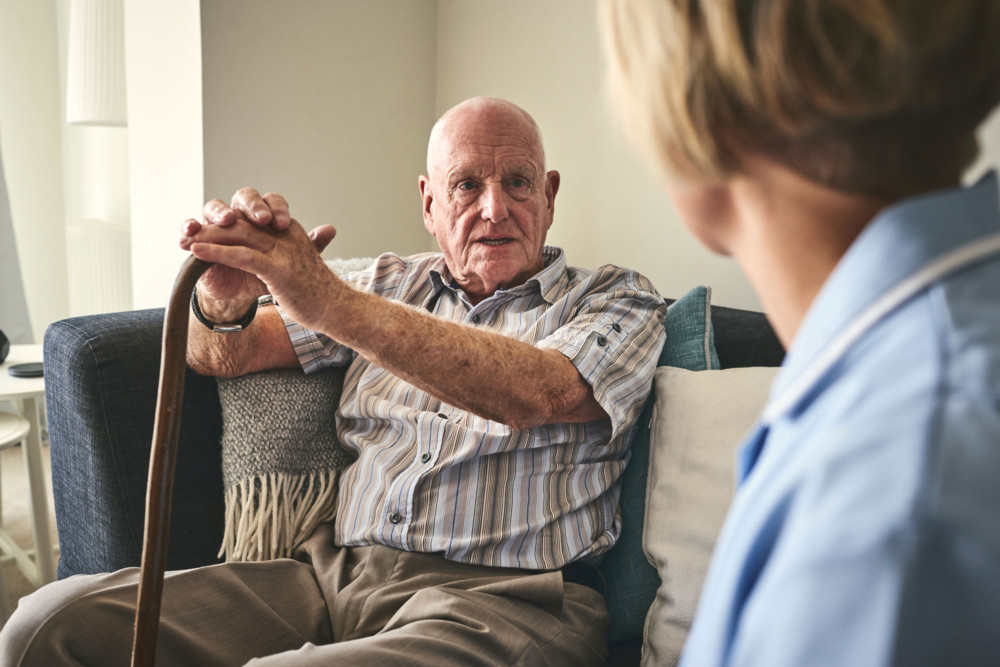 I ask my client, simultaneously curious and trepidatious. Death is a difficult topic for many of us, especially those of us who live in Western society, which places a taboo over the topics of death and dying. This very taboo may be arousing some discomfort in you as you read this. My goal is not to cause discomfort, but rather to challenge the notion that we benefit from avoiding thinking about death and to present an alternative in which confronting our mortality can lead us into living more fulfilling lives.
I ask my client, simultaneously curious and trepidatious. Death is a difficult topic for many of us, especially those of us who live in Western society, which places a taboo over the topics of death and dying. This very taboo may be arousing some discomfort in you as you read this. My goal is not to cause discomfort, but rather to challenge the notion that we benefit from avoiding thinking about death and to present an alternative in which confronting our mortality can lead us into living more fulfilling lives.
The Death Taboo and Death Anxiety
In Western society, talk of death typically incites feelings of fear, anxiety, and dread. In a culture that prioritizes positivity and feeling good, we tend to avoid conversations that elicit such emotions. Beyond this, our culture values youth, vitality, and productivity, which contributes to an aversion to aging and older adults, as we recoil at the reminder of the impermanence of these attributes. Finally, fear of death connects to fear of the unknown. What happens after death may be the ultimate question without an answer, which produces significant discomfort in a culture that yearns for certainty, whether through scientific inquiry or religious doctrine.
Why We Should Confront Our Death Anxiety
When something like death triggers anxiety, our natural response is to avoid the trigger and anything that reminds us of it. However, when we avoid a trigger, this only fuels the surrounding anxiety. The reduction of anxiety is rarely possible without confronting the very thing that we are trying to avoid. With certain anxieties, triggers are relatively avoidable and may never require confrontation (like airplanes, snakes, or extreme heights). However, death will inevitably touch each of our lives, whether through the loss of a loved one or our own imminent mortality, and chronic avoidance of death can leave us ill-equipped to handle it when it does show up at our doorstep.
What Does it Mean to Confront our Death Anxiety?
An acknowledgment of death and its inevitability is an acknowledgment of reality. Life, with all of its joys and trials, is limited in duration. We each are only given so much time on this planet, and we do not know how much time we will have. While it is natural for a reality like this to evoke some anxiety, if we sit with it a little longer, it can prompt a different response. If we can accept that time is a limited resource, this can drive us to cherish it even more and reflect on how we want to spend it. How do you want to spend your time? Are there things that you want to do more of? Less of? Are there ways that your life right now does not line up with your values, or the things that matter most to you in life? Are there changes that you can make, no matter how small, so that you can better live out your values?
Living Life Mindfully
Looking at death for the reality it is can not only help alleviate the anxiety surrounding death, but also motivate us to make the most out of life. When I discuss this with my clients, especially those whose lives have been touched by aging or chronic illness, I speak to them about striking a balance. We do not want to be so aware of death that its inevitability consumes us, poisoning our lives with anxiety and hopelessness. However, we also do not want to live in denial of death, as this can lead us to mindlessly move through the years, always assuming that we will have more time. There is a sweet spot somewhere in the middle, where a mindfulness of death can lead us to live more mindful lives.
My clients come from all faith backgrounds and belief systems. Usually, when I ask them what they think happens after death, their answers are not that frightening. They range from nothingness to reunion with family to oneness with the divine. No matter what they answer, I always take the opportunity to remind them that they still have time left before they face the great unknown. What do you want to do with that time?
Jordan Gerecke, LMSW, is a Master Level Therapist at Jewish Family Services of Delaware and part of the JFS Fellowship Program. She provides individual and group therapy services to clients experiencing a wide range of concerns, including depression, anxiety, grief, chronic illness, and caregiving stress.
Start your therapy journey today by submitting an online intake form or contact our Intake Department at 302-478-9411 ext. 306
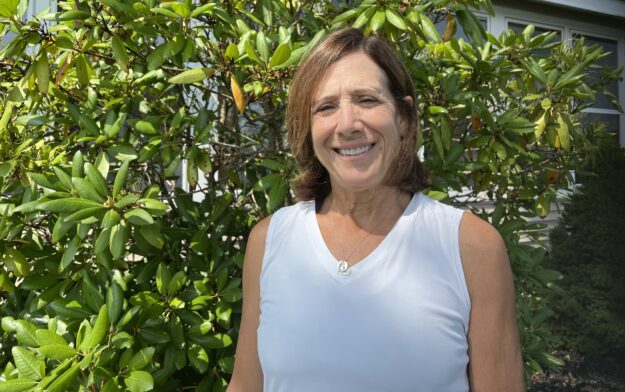
We here at JFS Delaware would not be able to fulfill our mission to strengthen individuals, families, and the community without the help of our incredible volunteers. One of those amazing volunteers is Beverly. Let’s get to know Beverly!
Why did you decide to volunteer for JFS?
“I started by helping out with rides while looking into the refugee program. Watching the news nightly I felt the need to help out in any way I could with those that were having to leave their homelands.”
What is the best part of volunteering?
“The best part of my driving volunteering is meeting new people and learning about them and their amazing stories. The best part of the refugee program is meeting and finding out that there are so many people in the community that want to help. I have not encountered anyone who has been negative. When I mention a need or when I am with a refugee family at a doctor, social services, and various appointments, everyone is so helpful and asking what else does the family need. Our group likes to say that we have many “angels” looking over our shoulder.”
Would you recommend volunteering for JFS? Why?
“Yes! Helping others has helped me see the world from a different perspective. And helping
others has been proven to be great for one’s mental health, and who wouldn’t want that?”
What is a fun fact about you?
“I was a collegiate gymnast and growing up I participated in many sports, but my favorite was playing rugby.”
If you could go anywhere in the world for your next vacation, where would you go? Why?
“South Africa! Everyone that has been has said it was their best vacation ever. I am going next summer!! I’m just not excited about the long plane ride.”
When you were young, what did you want to be when you grew up?
“A nurse, but after volunteering in a hospital when I was 15 I learned I didn’t like the sight of blood. So I became a social worker and worked in a hospital setting for 37 years. I still can’t stand needles and blood!”
What is one food you could eat every day?
“Cheese!”
What is the last show you binged?
“The Bear.”
What is the best book you ever read?
“I read several books a month since I retired and I can’t even tell you the name of the one I am reading now without looking at it! So I unfortunately can’t say my favorite book. I love all kinds. Joining a book club 19 years ago made me read many books that I wouldn’t have considered. and also enabled me to meet a wonderful group of women who are the women that are helping with the refugee family.”
What are you most thankful for you in your life right now?
“My family, home, and health.”
__________________________________________________________________________________________________________
Our work is made possible by dedicated volunteers like YOU! Volunteers supplement the professional, clinical care provided by JFS by fostering a sense of community, building relationships, and extending your skills and kindness to older adults, refugees, and other clients of JFS. Click here to apply to be a volunteer for JFS.
About JFS Delaware
Jewish Family Services of Delaware is a place where all members of our community can receive help and support to overcome life’s challenges and cope with difficult situations. JFS is committed to providing the highest quality services available in our area, with compassion and respect for everyone. Our mission is to strengthen individuals, families, and the community by providing counseling and support services, based on Jewish values. To stay up-to-date on the latest news from JFS, sign up for our newsletter by submitting your e-mail at the bottom of the page.